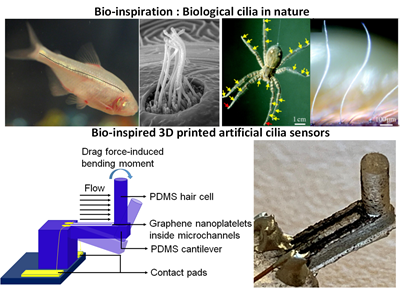Bioinspired 3D printed artificial cilia flow sensors
Sensor designs found in nature, such as tiny hair-like 'neuromasts' on fish skin, are optimal due to their evolution over millions of years, making them well-suited for sensing applications. However, realizing these complex, three-dimensional (3D), biomimetic designs in artificial and flexible sensors using conventional techniques such as lithography is challenging and expensive. Dr Ajay Kottapalli and co-workers in ENTEG introduced a new processing paradigm for the simplified fabrication of flexible sensors featuring complex and bioinspired structures using 3D printing and polymer molding.

The work is part of a broader thrust in Dr. Kottapalli's research to use flow sensing principles inspired by nature (e.g. fishes, seals and sea lions, crocodiles, human inner ear etc.) to fabricate artificial sensors using state-of-the-art 3D printing technology. Such bioinspired sensors can be used in diverse applications such as biomedical devices (IV flow sensing, urine flow monitoring, breathalyzers etc.), pipeline leakage monitoring, underwater vehicle maneuvering, oil sloshing in cargo tanks, and so on.
This link leads to the full paper A. M. Kamat et al Bioinspired Cilia Sensors with Graphene Sensing Elements Fabricated Using 3D Printing and Casting , published in MDPI Nanomaterials
| Last modified: | 28 May 2021 3.23 p.m. |
More news
-
24 March 2025
UG 28th in World's Most International Universities 2025 rankings
The University of Groningen has been ranked 28th in the World's Most International Universities 2025 by Times Higher Education. With this, the UG leaves behind institutions such as MIT and Harvard. The 28th place marks an increase of five places: in...
-
05 March 2025
Women in Science
The UG celebrates International Women’s Day with a special photo series: Women in Science.
-
16 December 2024
Jouke de Vries: ‘The University will have to be flexible’
2024 was a festive year for the University of Groningen. In this podcast, Jouke de Vries, the chair of the Executive Board, looks back.
